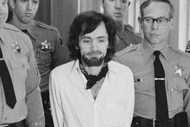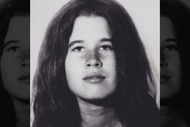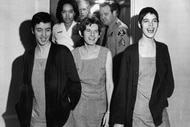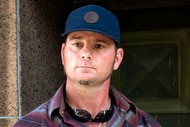Create a free profile to get unlimited access to exclusive videos, breaking news, sweepstakes, and more!
Did Ed Kemper, The 'Co-Ed Killer' From 'Mindhunter,' Keep Trophies Like BTK?
In "Mindhunter," Ed Kemper, played by Cameron Britton, tells FBI agents he took “little trinkets... reminders of my experience" from his murder victims.

While Ed Kemper took up more screen time than any other serial killer in season one of “Mindhunter,” it seems the “Co-Ed Killer” has taken a back seat during the series’ second installment, which is probably a good thing for FBI agent Holden Ford (Jonathan Groff).
Throughout season one, Ford and Bill Tench (Holt McCallany), his co-worker from the FBI’s Behavioral Science Unit, interview Kemper (Cameron Britton) for their study on serial killers. As Tench puts it, they speak to “criminals convicted of violent crimes, classify their behavior, and create a profiling manual for domestic law enforcement.”
In episode five of season two, the pair again meet up with Kemper to have a quick chat before their interview with cult leader Charles Manson. At this point in the story, Holden and Tench are assisting law enforcement in Wichita, Kansas, with their investigation into the BTK murders. They need to ask Kemper about his compulsion to return to the scene of his murders to gain more insight about the BTK Killer.
Kemper tells the agents he revisited the sites of his victims to “relive the experience, feel the same elation, the incredible release... I would also relive the sexual gratification.” If he could not make it back to the site, Kemper said he would use “little trinkets... reminders of my experience.”
But is that true of the real-life Kemper?
In reality, Kemper was indeed known for taking trophies — personal items from his victims — including photographs, wallets, and identification cards. He would also often decapitate his victims and save their body parts for sexual gratification.
When Kemper killed 18-year-old Cindy Schall on January 7, 1973, he brought her body back to his mother’s house, dismembered her remains, and had sex with them. He buried Schall’s severed head face up in the garden that his mother’s bedroom overlooked because, he would later say, "She had always wanted people to look up to her."
From 1972 to 1973, Kemper abducted and murdered six female students. In a gruesome final act, Kemper bludgeoned his mother, Clarnell Strandberg, with a claw hammer and strangled her friend, Sara “Sally” Hallett. When his mother was dead, he cut off her head and “humiliated” her corpse. He then placed her head on a shelf, “screamed at it for an hour” and threw darts at it. Later, Kemper removed Strandberg's tongue and larynx and put them in the garbage disposal.
Kemper then confessed to police, and he was arrested and indicted on eight counts of first-degree murder. During Kemper's trial, his defense team pleaded not guilty by reason of insanity. When Kemper took the stand, he told the jury he killed the six female students because he wanted them “for myself like possessions. They were going to be mine.”
The jury found Kemper “legally sane,” and on November 8, 1973, after five hours of deliberations, he was convicted on eight counts of murder. The following day, he was sentenced to life behind bars.
Since his imprisonment, Kemper has taken part in multiple interviews with psychiatrists, journalists and members of law enforcement to speak about his crimes, the most notable of which are his conversations with FBI special agents John Douglas and Bob Ressler for their study on serial killers. Along with Boston College professor Ann Burgess, they used Kemper’s admissions about his life and murders to help profile future serial killers. Ford and Tench in "Mindhunter" are based on Douglas and Ressler.


























